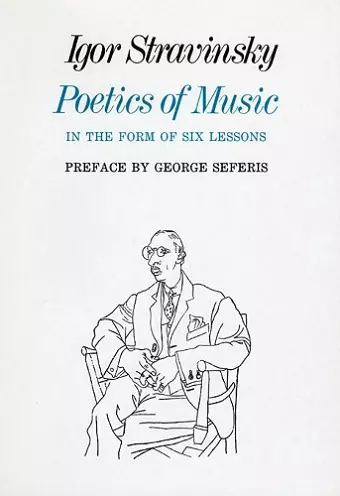Poetics of Music in the Form of Six Lessons
Igor Stravinsky author George A Seferis author Arthur Knodel translator Ingolf Dahl translator
Format:Paperback
Publisher:Harvard University Press
Published:31st Jan '93
Should be back in stock very soon

One of the greatest of contemporary composers has here set down in delightfully personal fashion his general ideas about music and some accounts of his own experience as a composer. Every concert-goer and lover of music will take keen pleasure in his notes about the essential features of music, the process of musical composition, inspiration, musical types, and musical execution. Throughout the volume are to he found trenchant comments on such subjects as Wagnerism, the operas of Verdi, musical taste, musical snobbery, the influence of political ideas on Russian music under the Soviets, musical improvisation as opposed to musical construction, the nature of melody, and the function of the critic of music. Musical people of every sort will welcome this first presentation in English of an unusually interesting book.
[These lessons] provide penetrating glimpses into the thought processes of Stravinsky's mind. While dealing with his chosen topics--the phenomenon of music, the composition of music, musical typology, the avatars of Russian music, and the performance of music--he reveals his reverence for tradition, order and discipline. He believes "the more art is controlled, limited, worked over, the more it is free." His opinions about Wagner, Verdi, Berlioz, Hindemith, Weber, Beethoven, Glinka, Tchaikovsky, Moussorgsky and Bach are refreshing. He also analyzes the function of the critic, the requirements of the interpreter, the state of Russian music, and musical taste and snobbery. * The American Recorder *
Some good (and some specious) phrases from one of music's finest phrase-makers; a fascinating and sporadically valuable attempt to come to grips with the metaphysics of music; and a rich assortment of historical aperçus. More than that, it is, of course, an intimate profession of faith revealing the detailed ideological context of the music; it is also the source of that unforgettable advice to the violinists: "It is ill becoming when playing, to spread one's legs too far apart." During the academic year 1939-1940, Stravinsky delivered the Charles Eliot Norton Lectures at Harvard. He spoke in French. An English translation appeared in 1947, and now this bilingual edition enables the reader to study both the language in which Stravinsky conceived his "lessons" and the excellent English translation…printed on the facing pages…The six lectures that make up Poetics take the form of an "explanation of music"…[The book] remains a quintessence of Stravinsky's reactions to the phenomenon of music. Poetics of Music offers the most coherent statement of the unchanging values behind Stravinsky's many apparent shifts of manner: his insistence, for example, that music should be a revelation of a higher order to be faithfully executed by the performer, rather than a medium of self-expression to be interpreted. Above all, the composer must submit to rules, no matter how arbitrary, for "the more constraints one imposes, the more one frees one's self of the chains that shackle the spirit." -- G. W. Hopkins * Musical Times *
ISBN: 9780674678569
Dimensions: 184mm x 127mm x 13mm
Weight: 159g
160 pages